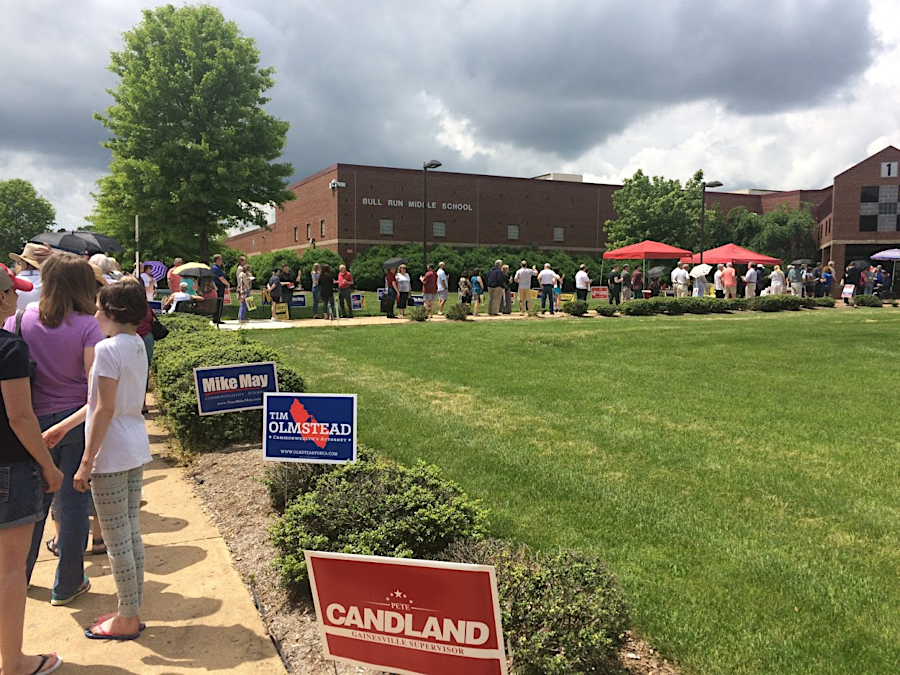
the 2019 Republican "firehouse primary" in western Prince William attracted 50% more voters than predicted

the 2019 Republican "firehouse primary" in western Prince William attracted 50% more voters than predicted
A major role of political parties is to nominate candidates that will advocate for the key principles of the party. In Virginia, political parties nominate candidates for up to five constitutional officers at local levels of government: Clerk of the Circuit Court, Treasurer, Commissioner of Revenue, Commonwealth's Attorney, and Sheriff. Parties also choose candidates for Town Council in 191 towns, City Council in 38 cities, and Board of Supervisors in 95 counties.
At the state level, parties can choose candidates for 100 House of Delegates seats, 40 State Senate seats, plus Governor, Lieutenant Governor, and Attorney General. In some areas where one party is dominant, there may be only one candidate on the ballot for a local or General Assembly seat.
Nationwide, in 2024 nearly half of local races were uncontested with just one name on the ballot. Political parties seek to contest every election in order to offer a choice and expand the number of partisan supporters over time, but at times can not find a candidate willing to go through the time-consuming campaigning process while facing inevitable defeat.
Voters in the City of Covington decided in 2022 to switch to an elected school bord. However, when it held its first election for school board in November 2024, there were no candidates listed on the ballot. No one had collected signatures on a petition, and since school board offices were a non-partian position no political party could submit a nomination. A former school board member, previously appointed by the Covington City Council, did choose to campaign for write-in votes.
Running as a write-in candidate is the tradition in Clinchport; no one seeks to be listed on the ballot in that town in Scott County. Those who choose to participate in the election write in names for a mayor, five members of town council, and town recorder.
The 2020 Census recorded 64 residents in the town. Nine people voted that year, when the town election was in May and the COVID-19 pandemic was raging. In 2024, there were 53 registered voters and 44 people cast ballots. There was a tie for the fifth seat on Town Council, with three people receiving two votes each. The winner was selected by placing names inside plastic Easter eggs and then choosing one at random.
At the Federal level, candidates are nominated by political parties or through independent collection of signatures for 11 US House of Representatives seats and two US Senate seats. The process for choosing a president is different, however.
Candidates for being one of Virginia's 13 Electors who vote in the Electoral College for President and Vice-President are chosen at state conventions held by each party. Participants in the conventions are chosen by district committees. The number of votes for each district are based on formulas defined by each party. On the first ballot of the state convention, participants are honor-bound to vote for the candidate who won the most votes in their district's primary, caucus, or convention - one reason that political parties select reliable members as their delegates, rather than independents.
President Biden won the primary in 2024. After he withdrew and released his convention delegates, he encouraged them to vote for Kamala Harris. Delegates to the Democratic National Convention in Chicago had the option to vote for whoever they preferred; they were no longer obligated to vote for the primary winner on the first ballot at the party's convention.
The names of the Presidential candidates appear on Virginia ballots in November every four years, but voters actually are choosing Electors in that process. The 13 Electors for the winning candidate, as certified by the Virginia Department of Elections, assemble every four years at noon on the first Tuesday after the second Wednesday in December following their election. They are the only Virginians who vote directly for President and Vice President.
In Virginia, electors do not have the option to be "faithless." They can not violate their pledge and vote for someone other than the person who won the most votes in November for president and vice-president. The Code of Virginia states that any elector who fails o vote for the candidate to whom they are pledged automatically vacates the office of elector and shall be replaced immediately by the other electors.
Independent candidates not associated with any political party qualify to get on a ballot by submitting petitions with signatures of registered voters to the local registrar. Each office requires a specific number of signatures of registered voters within the district(s) to be represented by that office. In 1936, there were seven nominees for president on the Virginia ballot. The last time there were just two nominees, one Republican and one Democratic, was in 1928.
Independents must find supporters or hire contractors to collect enough signatures to qualify. Occasionally they get assistance from major party candidates trying to split the vote.
In 2018, U.S. Representative Scott Taylor was defeated after staffers were caught forging signatures to get a third-party candidate nominated as an Independent. That candidate had failed to win nomination from the Democratic Party, but getting her on the ballot was expected to divert enough votes from the official nominee to help elect Republican Rep. Taylor. After testimony that even dead people had supposedly signed the petition, the judge forced the "independent" candidate off the ballot. In the election, the Democratic candidate won the race to replace Rep. Scott Taylor in the US House of Representatives.
Staffers working for the Republican incumbent were indicted for illegally adding names to the "independent" candidate's nominating petition. Three pled guilty, after charges of felony election fraud with a maximum sentence of 10 years in prison, were reduced to misdemeanors. In the plea deals, they were sentenced to a one-year suspended jail sentence and fined $1,000. Rep. Taylor's political consultant was charged three years later with 10 counts of false statements and election fraud. He pled guilty in 2022 after charges were reduced to misdemeanors, and received a three-year suspended sentence.
Rep. Scott Taylor stated he was aware of the petition effort, but not of the forgery or the failure to witness signatures. When he ran again in 2020, unsuccessfully hoping to win back his seat, there were no issues with petition signatures.1
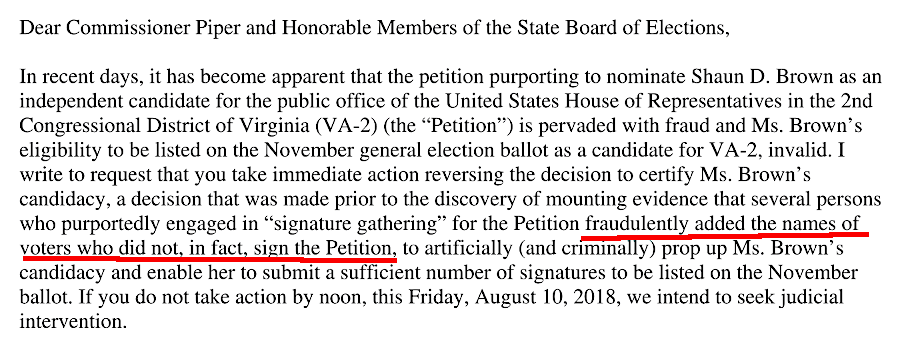
the Democratic Party successfully pressed to remove a third-party candidate from the ballot in 2018, since nominating petitions were fraudulent
Source: Blue Virginia blog, Letter to Virginia Board of Elections: "If you do not take action by noon this Friday, August 10, 2018, we intend to seek judicial intervention" (August 9, 2018)
Outright fraud occurs in various steps for candidates running for all types of offices. Most attention regarding voter fraud is focused on actual elections, especially after President Donald Trump claimed without evidence that voter fraud cost him the 2020 election, but it also occurs in the nominating process.
In 1894 "Cyclone Jim" Marshall, the Democratic incumbent, lost the nomination contest to return to his seat in the US House of Representatives. During the nominating convention, supporters of H. S. K. Morison announced that a telegram indicated Dickenson County Democrats were supporting Morison. In response delegates to the convention nominated him, but later it was revealed that the telegram had been faked. Morison then declined the nomination until a second convention was held. He won the nomination again, but in the general election was defeated.
In 2019, a member of the Patrick County School Board who had served for almost 12 years submitted petitions to be on the ballot again. Though he had more than the required number of signatures, some were fraudulent. The candidate certified under oath that he had witnessed all the voters signing his petition, but that was not true. After being indicted, he resigned from the School Board, ran for re-election, and was defeated. He plead guilty, but a state judge chose to take the charges "under advisement" for a year. That allowed the defendant to avoid punishment if he had no further brushes with the law for a year.
In 2020, the Virginia Department of Elections certified Kanye West as the presidential candidate of the Birthday Party. However, a Circuit Court judge blocked his name from being printed on the ballot, after determining that most of the petitions of the 13 electors for the Birthday Party were fraudulent.2
Political parties are responsible for submitting required paperwork to the Virginia State Board of Elections that identifies their party's official nominee. Both party officials and candidates make mistakes. The State Board of Elections and Circuit Court judges determine if those mistakes are minor enough to allow a person to appear on the ballot anyway, or serious enough to block the name of a candidate from being printed.
In 2019, the Democratic Party sent the official material to the wrong email address, and state officials were not notified by the deadline of the Democratic nominee for the 76th District in the House of Delegates. Republican officials failed to deliver the required paperwork for their nominee for the 1st District. In both cases, the State Board of Elections determined that the party intent was clear and placed the nominee's name on the ballot.
State officials also relied upon the notification by state Republican Party officials of their nominee for the 97th District of the House of Delegates that year. The local party officials had run both a nominating convention and a primary in 2019 for that district, an unusual duplication that reflected factional fighting between two candidates. The State Central Committee determined the winner and provided the official notification.
That state board refused to certify the Republican candidate for the 30th District of the House of Delegates. The incumbent, Delegate Nick Freitas, failed to submit two sets of required paperwork, and submitted just one. His name was left off the ballot. He then mounted the first successful write-in campaign for a General Assembly seat since 1989, educating 58% of the voters to look pass his Democratic opponent's name and add something close to "Nick Freitas" on the line below it reserved for write-in votes.
When Del. Freitas sought the Republican nomination in 2020 for the Seventh Congressional District, he missed the registration deadline again. The State Board of Elections allowed him to be listed on the Republican primary ballot for that seat in 2020, in part because the COVID-19 pandemic had disrupted the election schedule. After a 2-1 vote to list his name, a member of the state board proposed creating a new sanction for missed deadlines, one with less severity than denying a candidate a place on the ballot.
The State Board of Elections has no flexibility in authorizing names to be placed on
In 2023, the Lunenburg County Democratic Party Committee was in transition as the chair of the nominating committee was seriously ill. The candidate for the 9th District State Senate seat and the local committee filed all the required paperwork with the state elections office. However, the e-mail transmitting Form 527 (the Party Certification of Primary Candidates, officially certifying the candidate as the party nominee) omitted the ".gov" at the end; the certification was never received by the Virginia Department of Elections.
Based on advice from the Attorney General, both the Department of Elections and the Democratic Party of Virginia stated in 2023 that there was no mechanism to place the candidate's name on the ballot. The Board of Elections had flexibility in adding names to the general election ballot, but only for candidates who were nominated by methods that did not use the state-run primary.
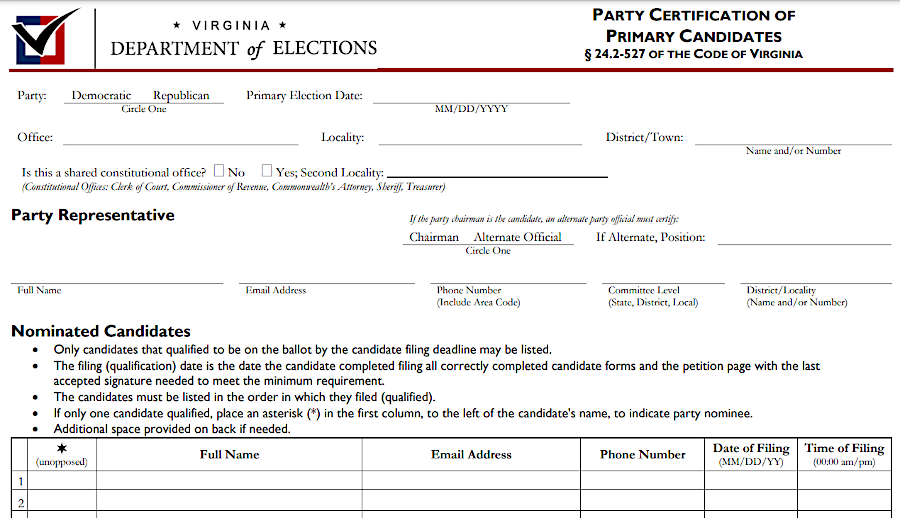
to get on the ballot, official paperwork must be filed by specific deadlines with the Virginia Department of Elections
Source: Virginia Department of Elections, Form 527 - Party Certification of Primary Candidates
A 10-day extension was allowed by election law for filing paperwork late, in order to get on the ballot for nominating primaries (as opposed to the general election ballot in November). In 2021 the Board of Elections declined to authorize use of the extension. In 2023, the Board of Elections made the opposite decision. It allowed a 10-day extension for candidates who failed to meet the filing deadline for submitting paperwork for the primary election.
Part of the justification for allowing extensions in 2023 was that the 2021 redistricting by the Virginia Supreme Court had realigned many boundaries of General Assembly districts significantly, undoing previous gerrymanders. Many incumbents chose to retire rather than run against other incumbents or seek election in districts with a new set of voters.
Because a Republican had replaced a Democrat as Governor after the 2021 election, the State Board of Elections had a Republican majority and there was a new Elections Commissioner in the Virginia Department of Elections. The Chair of the State Board of Elections, the only member of the board who had been on it in 2021, commented in 2023:3
Any political party that has earned 10% of the vote for a statewide office can avoid the signature collection process and use alternative selection processes. To date, only Republican and Democratic parties have been able to cross the 10% threshold. Candidates that the parties nominate must still meet state requirements to qualify for the office, such as living within Virginia for at least one year immediately preceding the election. The Virginia Department of Elections publishes a "candidate bulletin" defining specific requirements for different offices.
Incumbent State Senator Amanda Chase lost in the June 20, 2023 Republican primary. She then announced she planned to mount a write-in campaign in the general election, because she could not get on the ballot as an independent. She later backed off of that effort, but other primary losers did ask voters to write in their names. One Northern Virginia House of Delegates candidate filed suit to overturn the June 20, 2023 primary decision because she claimed the Democratic Party had unfairly assisted her opponent.
If a candidate runs for a political party's nomination in a state-run primary, they must win or withdraw from the race before election day in order to appear on the ballot in the general election. Virginia's "sore loser" law prohibits a losing primary candidate from filing later as an independent and being included on the ballot:4
There are different ways for a political party to choose their candidates, without the headache of collecting signatures. In the past, political bosses chose the candidates and voters had little role in the nomination process. Conventions with a stereotypical "smoke filled back room" are still an option, though likely to be at non-smoking venues now.
Until 1988, the Republican Party in Virginia nominated all of its presidential candidates via a convention. After 1988 until 2000, conventions were used again for those nominations. Starting in 2000, a primary has been used for all Republican presidential nominations except in the years 2004 and 2020.
In 2018, US Representative Thomas Garrett abandoned his campaign for re-election after the filing deadline, at a time when he was the official Republican nominee.
The 37 members of the 5th Congressional District Republican Committee then chose who would replace Rep. Garrett as the Republican nominee for the 5th District seat in the US House of Representatives. Six last-minute candidates, including one who had just been defeated for the Republican nomination in the adjacent Sixth District where she lived, sought support from members on the committee.
The campaign process focused on just the 37 Republican voters in the district who served on the 5th Congressional District Republican Committee. They met in the auditorium of Nelson County High School, with observers in the seats, and on June 2 chose Denver Riggleman to be the new candidate. He went on to win election in the general election on November 6, 2018.
Rep. Riggleman turned out to be too libertarian for many of the Republican officials in his district, especially after he officiated at a same-sex wedding, though he received President Trump's endorsement. The District Committee chose to hold a convention in 2020 rather than the firehouse primary Rep. Riggleman desired, knowing that his independent supporters were less likely to participate and ideological purity would be maximized.
In the convention process, local Republican committees in 21 counties and two cities elected 3,500 delegates to attend a one-day meeting to select the nominee. A convention dominated by conservative Republican officials would give an advantage to Riggleman's opponent, the former athletics director at Liberty University who described himself as a "bright red biblical and constitutional conservative". The chair of the 5th District Republican Committee also arranged for the convention to be held at the church of Rep. Riggleman's opponent.
The spread of the COVID-19 disease in the 2020 pandemic created the possibility that a crowded convention room would be illegal, since it would violate a state ban on mass meetings established to maintain social distancing. The alternative for nominating a candidate was to repeat the 2018 process in which only the 37 members of the 5th Congressional District Republican Committee chose the candidate.
In that hypothetical scenario, it was possible that no candidate could meet the requirement to get two-thirds of the vote (instead of a simple majority). Unless the state committee altered the rules, there was theoretical possibility that no Republican would be nominated in 2020 for the 5th District race. The 5th Congressional District Republican Committee chose to let party activists decide via an "unassembled mass convention."
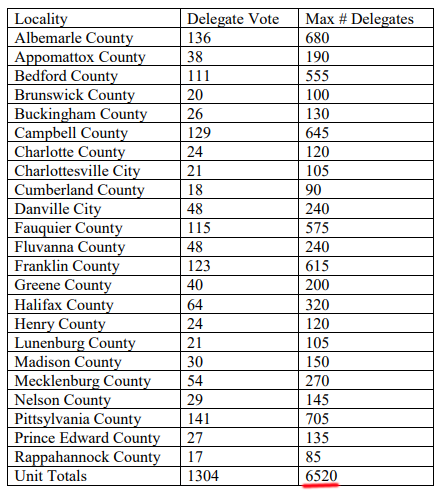
up to 6,520 delegates could be chosen by local County/City Republican Committees to vote at the 2020 convention in the 5th District
Source: 5th Congressional District Republican Committee, Fifth Congressional District Republican Party Official 2020 Convention Call
The unique convention was held in the parking lot at the Tree of Life Ministries in Campbell County. Delegates were instructed to drive there, fill out ballots inside their cars, hand them to a teller, and drive away without ever leaving their car or mingling with other delegates. Tree of Life Ministries was the personal church of the more-conservative candidate, and that location made it more convenient for his supporters to participate. In this party-run primary, 200 volunteers directed drivers to go through different lines to vote based on where they lived. One car with three voters had to drive through twice, because one person in that carpool lived in a different county.
In 2016, 856 Republicans had chosen Thomas Garrett as their candidate in a 5th District convention, and he received 207,758 votes in the 2016 general election. In 2018, 37 members of the 5th Congressional District Republican Committee had made the decision, and 165,339 people voted for Denver Riggleman in the November 2018 election. In 2020, up to 6,520 people could file to serve as a delegate and 3,500 were chosen. In the drive-through convention, 2,537 delegates appeared and voted in the largest Republican convention turnout on record for the 5th District
Though voting finished at 7:00pm, results were not announced until 1:00am. The incumbent Congressman was defeated decisively in the 2020 convention by his challenger, 58%-42%. President Trump and Rev. Jerry Falwell Jr. endorsed Rep. Denver Riggleman, but he was not conservative enough for the delegates who participated in the 2020 convention.
Rep. Riggleman complained of ballot stuffing and voting irregularities in the convention. He did not endorse Bob Good, the man who defeated him, but Good ended up winning the 5th District seat in the November 2020 general election. When the decision to hold a nominating convention rather than a primary was made initially, Rep. Riggleman had claimed the preferred process reflected corruption and voter intimidation by:5

the normal convention process was altered in 2020 for the 5th District Republicans, eliminating the traditional interactions between attendees
Source: 5th Congressional District Republican Committee, Official 2020 Convention Call
The coronovirus pandemic also caused the Roanoke City Democratic Committee to drop plans for a firehouse primary on May 2, 2020. Instead, the committee decided that its 70 members would choose the three nominees for the city council election in November. The committee decided that voting in person was no longer a safe process, an unusual assessment that was enhanced when Gov. Northam issued a shelter-in-place Executive Order. Organizing a mail-in ballot process in the short amount of time available was too expensive and too complex. Instead, the five candidates for three seats were given details on how to contact the committee members, so they could influence the nomination decisions that would be made by just 70 people.
In Richmond, a judge lowered the requirements to get on the ballot for the 2020 mayoral election because "social distancing" reduced the ability to get signatures on a nominating petition. Normally 500 signatures were required, with at least 50 coming from registered voters in each of the city's nine wards. The judge extended the deadline for submitting petitions, lowered the total number of signatures to 250, and required that only 10 signatures be collected in each election district.6
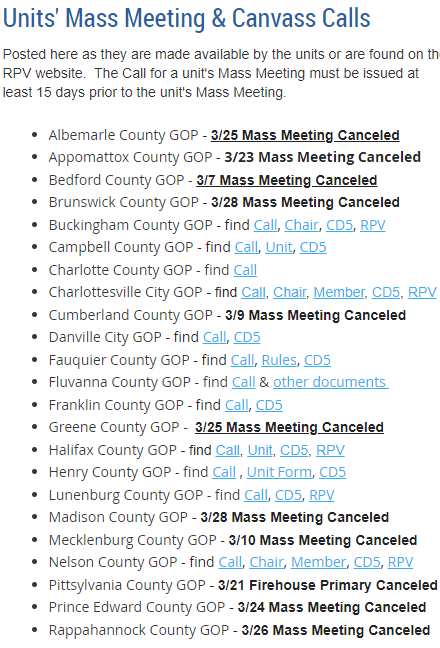
the coronavirus pandemic in 2020 disrupted the nomination process of the 5th Congressional District Republican Committee, forcing the cancellation of mass meetings
Source: 5th Congressional District Republican Committee, Biennial District Convention (as displayed on March 25, 2020)
A state-run primary is an election funded by the county or city in which the election is held. Candidates qualify for their party's ballot by collecting signatures, just like independent candidates do to get on the ballot in general elections.
For a presidential candidate to appear on the ballot in a state run primary, they must file petitions with 5,000 signatures from qualified voters, with at least 200 signatures from each of the state's 11 congressional districts. For a statewide office (US Senator, Governor, Lieutenant Governor, or Attorney General), 10,000 signatures are required, including the signatures of at least 400 qualified voters from each congressional district.
For a US Representative race, candidates must submit 1,000 valid signatures. The Democratic Party recommends submitting 1,500 total, with the expectation that a significant percentage of collected signatures will be invalid. In 2022, a candidate seeking the Democratic nomination for the 5th Congressional District submitted 1,093 signatures. Only 937 were certified, however, and the candidate was not listed on the ballot because the total was below the 1,000 signature requirement.
In 2020, a judge reduced the threshold for a US Senate candidate to get listed on the ballot for the Republican primary. Two candidates had collected enough signatures to qualify before the COVID-19 pandemic triggered requirements for social distancing. A third candidate complained that it was impossible to collect the additional signatures that he required, when people were directed to stay six feet away from each other.
One of the candidates who had already qualified objected to lowering the threshold for a rival who had not demonstrated having a robust organization capable of winning a statewide campaign in November against the Democratic incumbent, Sen. Mark Warner. However, a state judge decided that in the unusual circumstances, the third candidate should be added to the ballot even though he had collected only 3,769 of the required 10,000 signatures.
Independent candidates submit the petitions to the local General Registrar, or for statewide offices to the Virginia Department of Elections for review and certification. Candidates for a party's nomination, including "independent parties" other than Democratic and Republican parties, give their petitions to the chair of their political party.
The parties must review the signatures to determine that a sufficient number of qualified voters have signed, then certify the qualified candidates to the Virginia Department of Elections so those names will appear on the ballot. The order in which names appear on ballots is based on the time of filing for the office.7
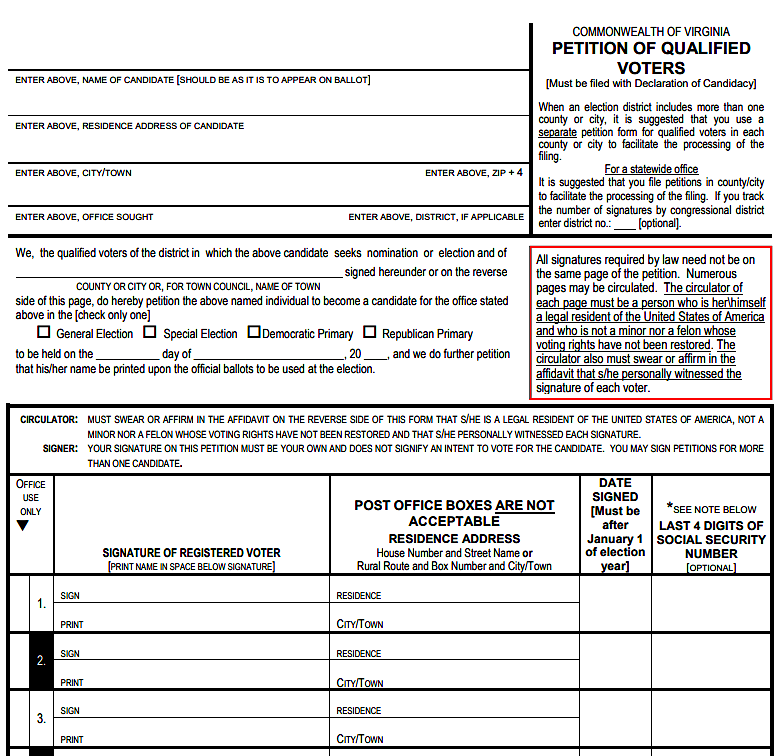
people hired to circulate petitions to get a candidate on the ballot do not have to be registered voters in the candidate's election district
Source: Virginia Department of Elections, Petition of Qualified Voters Form
For a state-run primary, local Electoral Boards arrange for use of all of the polling places in the precincts and hire enough staff, based on projected turnout, to handle the expected voters. Since voter turnout in nominating primaries is generally less than 10%, poll workers are rarely busy.
In a state-run primary, all registered voters can go to their normal polling place and cast a ballot to choose candidates. Virginia does not register voters by political party; election officials at a polling place do not have a list of registered Republicans or registered Democrats. As a result, a state-run "closed" primary limiting voters to just official Republicans or official Democrats is not possible in the state.
Virginia holds "open" primaries, and voters can request a Republican ballot or a Democratic ballot on election day. A person who considers themself to be a Republican could ask for a Democratic ballot, and vote for a candidate they consider to be the weaker rival of the Republican candidate in the general election. Similarly, a person who considers themself to be a Democrat could request a Republican ballot in a state-run primary, and get involved in choosing who will be nominated by the rival political party.
Only one ballot may be chosen on election day of a state-run primary; voters can help to choose just one party's candidates. There is no legal option for voting twice on primary day, getting a separate ballot the second time. However, if a voter lives in a district with a state-run primary on one day and a party-run primary of another day, the voter can participate in both. (That is also possible if each party sponsors a primary and they choose different days for those two events.)
In state-run primaries, voters can request a Republican ballot one year and a Democratic ballot the next year. Whichever ballot the voter requests will be provided. At the polling place in a state-run primary, officials check only to ensure a voter is registered in that district, before supplying whatever ballot is requested.
Open primaries allow partisan activists to cross over and engage in manipulating who is nominated in the opposing party. Republicans fear that Democrats might choose to vote in their primary and select the least-electable candidate or one who would support Democratic initiatives, a "Republican in Name Only" or RINO. Democrats have the same concern regarding Republicans shaping who the Democrats would nominate. Both parties wish to attract independents in the general elections, but the nominating process is designed to select candidates who are the most-committed to different Republican and Democratic priorities.
Some partisans participate in another party's primary because the district leans heavily Republican or Democratic. If the nominee of the dominant party is going to win the general election in November, then the only real choice will be for selecting the candidate in the primary. For much of the 20th Century, when Virginia was a part of the Solid South and the Byrd Organization controlled the state government, the real political contests were the Democratic primaries. Nomination by the Democratic Party in a primary contest was "tantamount to election" in November.
In June 2023, the Loudoun County Republican Party encouraged its members to vote in four Democratic Party primary contests. The goal was to get weaker candidates nominated by the Democrats, so in the general election in November the Republican candidate would have a better chance of winning.
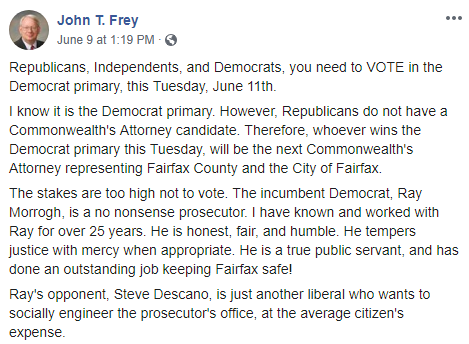
in 2019, the Republican Clerk of the Fairfax Circuit Court encouraged Republicans and Independents to vote in the Democratic primary
Source: John T. Frey, Facebook post (June 9, 2019)
Today, there are districts that are reliably Republican as well as reliably Democratic. Political differences are resolved in the nominating process, because the dominant party in that district is almost guaranteed to win in the general election. Incumbents who compromise in the General Assembly to get legislation passed become vulnerable to more ideologically "pure" opponents. Few voters bother to participate in the elections which choose candidates, and voters with a strong liberal or conservative bias typically have more influence in the nomination decisions.
Republican Del. Bob Thomas voted to support expansion of Medicaid in Virginia, as provided under the Affordable Care Act ("Obamacare"). That spurred a more-conservative opponent, Paul Milde, to challenge him in the primary for the 28th District seat. Del. Thomas lost by 143 votes to the challenger. Thomas had received 11,842 votes in a very close race against a Democratic candidate in 2017, but two years later a total of only 5,805 people voted in the 2019 Republican primary.
The intra-party rivalry may have been a key factor in the general election. The Democratic candidate who lost the close race in 2017 defeated Republican nominee Paul Milde in the 2019 contest by 736 votes, flipping the seat and helping his party take control of the House of Delegates.
One assessment of the race blamed Republican "big money players from outside the district" for the loss. The thesis was that the Republican establishment provided enough funding in the primary for Del. Bob Thomas to portray his opponent negatively. After the Thomas lost the primary to Milde, the negative image of the Republican nominee and the failure of "big money players" to finance his general election campaign affected results. About 3% of the voters who supported other Republicans in the general election "crossed over." They voted for the Democratic candidate running to replace Del. Thomas in the 28th District, providing the margin of victory.
Paul Milde's assessment was that the disparity in campaign financing doomed his campaign. He spent $527,000, just 40% of what the victorious Democrat spent. In Milde's opinion, because Republicans failed to contribute enough to the party's nominee in the general election, the Democratic candidate won the race.8

in the 28th District for House of Delegates, incumbent Bob Thomas was defeated in the 2019 primary by a more-conservative Republican - who then lost the general election
Source: Virginia Department of Elections, 2019 June Republican Primary and 2019 November General
Unofficial Results

the Democratic candidate raised far more funds in 2019 for the general election than the Republican candidate
Source: Virginia Public Access Project, House: General Elections
Today, some districts vote so reliably Republican or Democratic today that one party will not even bother to nominate a candidate.
For example, in 2015 the Republicans did not nominate a candidate for the 79th District for House of Delegates representing parts of Norfolk and Portsmouth. The Democratic candidate, who was destined to be elected, was chosen in the primary. Over 15% of the voters in that primary voted in Republican primaries before or after the 2015 election, offering a clue that 79th District Republicans were trying to choose their member of the House of Delegates by engaging in the Democratic primary.
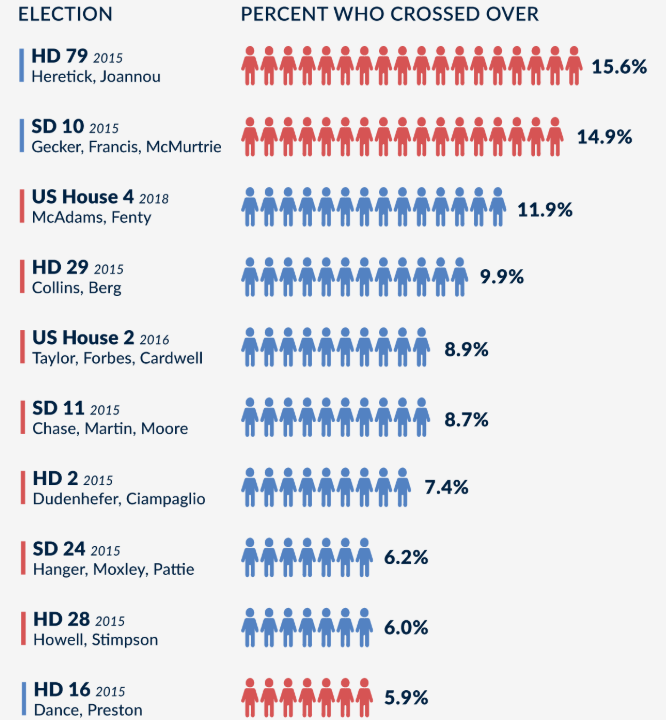
in 2019, the Virginia Public Access Project identified recent races with the highest percentage of crossover voters
Source: Virginia Public Access Project, Cross-Party Voting
Also in 2015, 10% of votes in the Republican primary for the 29th District of the House of Delegates came from apparent Democrats. It was obvious that the Republican nominee would win the election in that conservative area, in the Shenandoah Valley near Winchester. In the 29th District primary in 2015, the very-conservative Republican incumbent lost to a challenger by 34 votes in a 52%-48% decision. The 200 presumed Democrats who voted in that Republican primary, the "cross over" votes, may have determined the winner.9
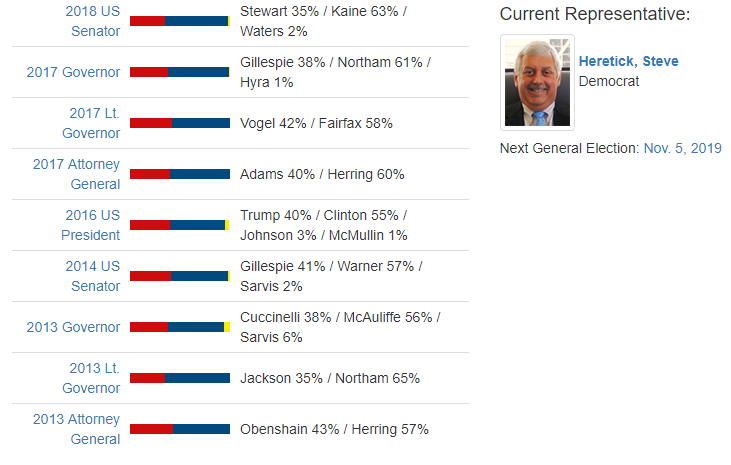
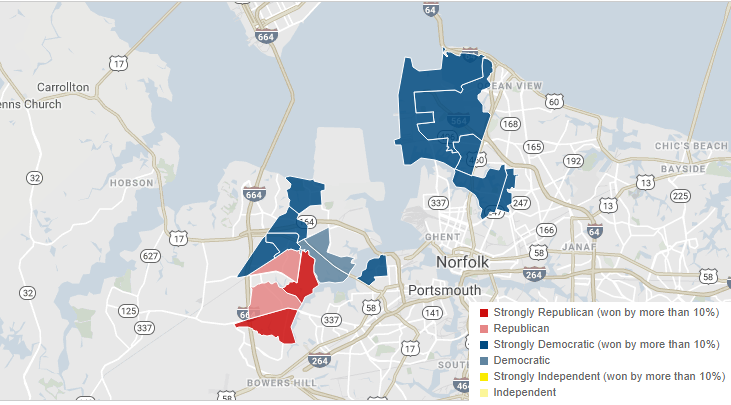
Democratic candidates received at least 55% of the votes between 2013-18 in the 79th District, so Republicans sought to influence the primary decision
Source: Virginia Public Access Project, House of Delegates District 79
The alternative to a state-run primary is a nomination process run by a political party. If a political party chooses to sponsor a primary, then that political party has to pay the costs of the primary election. Costs are minimized by recruiting volunteers to staff the polls and by limiting the number of polling places.
The advantage offsetting the costs is that in a party-run primary, only party members may be allowed to participate. A political party can use their own criteria to limit participation to just "loyal" Republicans or "true" Democrats. Party volunteers who staff the polls can use partisan criteria to determine who is eligible to vote. That screening process is not possible in the state-funded primary process; in those elections, a registered voter living within the district can participate in either the Republican or Democratic primary. If each party chooses to nominate candidates via a state-run primary but the primaries are scheduled on different days, it is possible for a voter to participate in both primary elections.
Anyone unwilling to sign a pledge can be turned away at the polling place and not allowed to vote in a party-run nomination process. In a party-run primary, those trying to cast a ballot can be blocked from voting if they have a track record of supporting candidates in the other party. Making campaign contributions to candidates in the other party, endorsing candidates in the other party, or voting in a previous state-run primary for the other party can be justification for declaring someone unqualified to vote.
Though voters in Virginia do not register by party, the Department of Elections will provide to qualified candidates and political parties a list of the elections in which a voter participated. Participation in a general election will not identify if that individual is a Republican or Democrat. However, a person with a pattern of voting in state-run primaries for Democratic Party candidates might be blocked from voting in a primary run by the Republican Party (and vice-versa). There are no state records of who participated in a party-run primary.
Potential voters can be required to sign a pledge that they will support the candidates of that one political party in the upcoming general election, though a party can choose not to require a pledge in a particular primary in order to encourage independents to participate. Voters can pledge to support candidates of a political party in the general election in order to participate in a primary, then violate that pledge with impunity. In the general election, the secret ballot ensures that no one will know which candidate a voter chose.
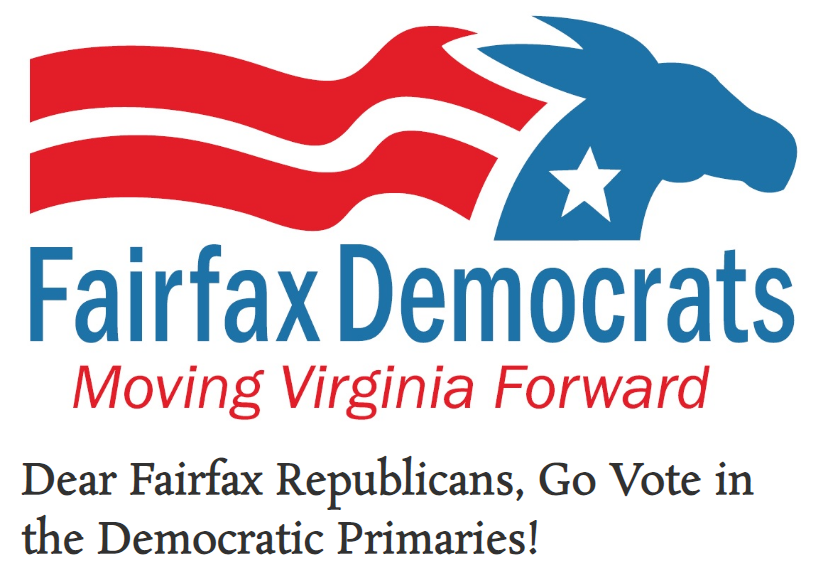
in 2018, an activist suggested focusing on Democratic primaries to support less-liberal candidates in Fairfax County because Republicans could not win general elections
Source: The Bull Elephant blog, Dear Fairfax Republicans, Go Vote in the Democratic Primaries! (December 8, 2018)
The type of primary affects turnout. State conventions in presidential election years can be large, stimulating voter enthusiasm but also requiring the party to pay for renting a large facility.
In 2016, the Republican Party of Virginia authorized election of 56,715 delegates and 56,715 alternates. The largest indoor facility in the state, the John Paul Jones Arena at the University of Virginia in Charlottesville, could accommodate less than 16,000 people. As expected, many potential attendees were not chosen when local jurisdictions selected their delegates; not everyone wants to spend two days literally in the political arena.
For the 2020 Quadrennial Convention, the Republican Party of Virginia booked the Vines Center at Liberty University. The call for the convention authorized party committees in local jurisdictions to select five people for each vote authorized from that jurisdiction plus five alternates, incentivizing a large turnout at the convention. Each person who attended had to pay a $35 fee, offsetting costs of the event.
Votes per jurisdiction in that convention were based on the 2016 election for president. For each 250 votes cast in a jurisdiction for Donald Trump, the jurisdiction was allotted one vote. Though Fairfax County was "blue" in 2016 and Trump received only 29% of the votes there, the high population and high turnout led to Fairfax County being allocated 1,100 votes. That was the greatest number of votes for a single jurisdiction at the 2020 Republican state convention. Small Highland County, which voted 69% for the Republican candidate, received the fewest votes (7).
The Republican Party decided in 2019 to use a convention rather than a primary to choose how Virginia's delegates should vote at the 2020 Republican National Convention planned for Charlotte, before the COVID-19 pandemic forced changes. The state convention also was used to choose two of the 13 people Virginia would send to the Electoral College if the Republican candidate won the 2020 presidential contest in Virginia. The other 11 electors were chosen by the 11 Congressional District committees, in regional conventions or mass meetings.10
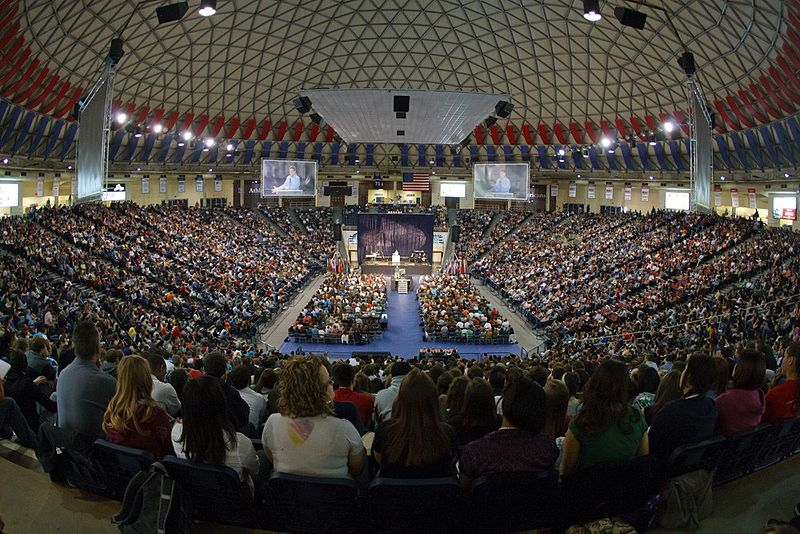
the Republican Party of Virginia chose to hold its 2020 Quadrennial Convention at the Vines Center on the campus of Liberty University, before the COVID-19 pandemic changed plans
Source: Wikipedia, Vines Center
Until 2024, party-run primaries could be organized as a firehouse primary (also known as a mass canvass, unassembled caucus or party canvass, with voting allowed throughout the day in multiple locations), mass meeting (assembled caucus with everyone in one location and voting until a candidate is selected), or a convention (with delegates chosen to represent electoral districts). The process affects which voters will participate. Traditional wisdom is that results of a firehouse primary represent the broadest range of opinions within the party, while conventions are tilted towards nominating the most-ideological candidate.
A firehouse primary resembles the state-run primary. Typically, one or a few spots within the election district are chosen as the polling places, such as the meeting room at the local volunteer fire department. Registered voters within that district can come at any time during the hours designated for voting, pass through the partisan screening process, cast their ballot, and go away. At the end of the day, votes are counted and the candidate who receives the largest number of votes will be the party nominee.
The process for a mass meeting or "assembled caucus" requires everyone to stay in the one location and vote, sometimes multiple times, until one candidate has received over 50% of the votes.
In 2023, the Republican Party nomination for a special election in the 9th State Senate District was held on December 19 in the Drakes Branch Volunteer Fire Department in Charlotte County. Over 800 voters registered to participate, the bay doors of the building had to be opened to accommodate the crowd, and voters cast ballots outside in near-freezing temperatures. On the fourth ballot around midnight, 504 voters were still present at the mass meeting.
A firehouse primary requires only that a voter appear at the polling place, demonstrate they are qualified according to the party's rules, and then cast a ballot. Voters may interact with each other while standing in line, but the process is less confrontational and more welcoming for independents who may support a less-polarizing candidate. A mass canvass or "assembled caucus" thus requires more of a time commitment on the part of the voter, and will typically attract fewer independents.
A convention is designed to give extra voting power to areas of the election district which are more supportive of that party's candidates. Local party officials determine before the meeting how many delegates will represent different precincts, and can give extra weight to votes of delegates from some areas because in previous elections those areas produced more votes for the party's candidates.
A convention can require a substantial part of a day, including listening to speeches by candidates. Party loyalists and partisan activists are more likely to participate in such a process. That tilts the nomination process away from a moderate towards a Republican or Democrat further out towards the extreme edge on the ideological spectrum. Independents in general elections are inclined to support moderates, so "electability" can be enhanced or minimized by the nominating process.
The State Central Committee of each party determines if it will nominate candidates via a primary or convention for statewide races - Governor, Lieutenant Governor, Attorney General, and US Senator. Local Legislative District Committees determine the nomination process for House of Representatives, House of Delegates, and State Senate seats.
County and city committees in each party determine the nomination process for local officials - city council, county supervisor, sheriff, Commissioner of Revenue, Clerk of the Circuit Court, Treasurer, and Commonwealth's Attorney. School Board members run as independents in theoretically non-partisan races, but local Republican and Democratic committees endorse candidates and help them get on the ballot by collecting signatures.
In 2024, a candidate for School Board in Virginia Beach challenged the legitimacy of his rival to be on the ballot. He claimed that many of the 125 signatures collected by his rival from within the district in order to qualify were invalid. The forms were dated when signature collection began, but some people did not sign until a day or two later. The rival chose to withdraw from the race.11
Until 2017, incumbents could choose the manner in which political parties would nominate their candidates for the next election. That power minimized the risk that a disgruntled faction within a party could derail an incumbent's renomination. The Sixth Congressional District Republican Committee sued, claiming that provision in state law violated the First Amendment in the US Constitution. Political parties are private groups with a "right of association," which the state had no justification in limiting. A federal judge and then an appeals court concurred, allowing the party organization rather than the incumbent to determine the nomination process.12
Bob McDonnell, a Republican candidate elected as governor in Virginia in 2009, was nominated in a convention.
A primary had been planned in 2013 until conservative and tea-party activists gained control of the Republican State Central Committee. They canceled plans to hold a statewide primary and chose to hold a convention to nominate statewide candidates in 2013. The calculation was that dedicated conservative activists would have more influence in a convention, rather than in a primary.
The change in the nomination process helped conservative Attorney General Ken Cuccinelli become the Republican candidate for governor. More-moderate Lieutenant Governor Bill Bolling withdrew from the race when the nominating process was switched to a convention. Cuccinelli's polarizing candidacy suppressed support of "establishment" Republicans and moderates, and in a close race Democratic candidate Terry McAuliffe won. He received 46.3% of the vote. Cuccinelli won 45.2%, and Libertarian Robert Sarvis won 6.5%.
In 2015 the Central Committee crafted a "gentleman's agreement" between the conservative and establishment wings of the party. It held a primary for the 2016 presidential election, and planned to hold a convention in 2017 to select statewide candidates. However, after the primary in 2016 the party officials switched in a 41-40 vote to hold another primary in 2017. That led to the nomination of more-moderate Ed Gillespie over a Donald Trump advocate, Corey Stewart, in a very close race. Gillespie lost to Ralph Northam that fall, in a wave election during which Democrats captured 15 seats in the House of Delegates.
One commentator has noted that the previous convention nominating process had limited the success of the Republican candidates. Nomination of moderates might have resulted in a candidate with greater potential to get support from independent voters and thus win a close general election, but in the convention process a candidate's ideological purity was often more important than his or her electability:13
In 2019 the Virginia Public Access Project calculated that the political party nomination process was twice as likely to result in the defeat of an incumbent than the general election process. Competition within a political party created a greater risk to re-election that competition with the other party.14
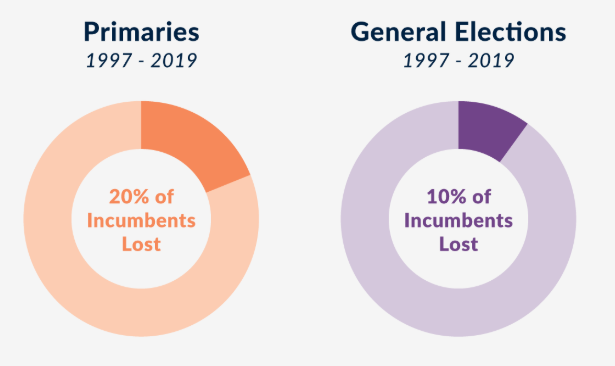
incumbents are more likely to be defeated in a primary than in a general election
Source: Virginia Public Access Project, Primaries: More Perilous For Incumbents
The advantages of manipulating the nomination process were revealed in two 2019 elections.
In Prince William County, the incumbent Chair of the Board of County Supervisors chose not to run for re-election. The supervisor of the Coles District, Marty Nohe, announced his plans to run for the chairman's seat after representing his magisterial district for the last 15 years.
Republican Party activists in the county considered him to be an unreliable conservative. To steer the election towards a candidate with a different agenda on social issues and who would be less-accommodating for new development, local party officials decided to use a firehouse primary to nominate candidates for 2019. That required paying for the costs to staff polling booths and recruiting volunteers. The alternative was to nominate their 2019 candidates through a state-run primary where costs would be covered by government funds, a choice the Democrats made.
The party-run firehouse primary allowed the Republicans to determine who would be allowed to participate. Those seeking to vote could be screened for their party loyalty, and people with a track record of contributing to Democratic candidates or voting in Democratic primaries could be turned away. In addition, those trying to vote could be required to sign a loyalty pledge committing to support Republican candidates in the general election, and anyone declining to sign the pledge could be blocked from voting.
Those screening techniques were legal in the privately-run nominating contest organized by the Republican Party, in contrast to the state-run primary process. Limiting the opportunity to vote to "reliable" Republicans was expected to deter independents and Democrats from participating in the Republican primary. That did tilt the playing field away from the supervisor of the Coles District, and a candidate running as a pro-Trump conservative (despite previously running as a Democrat and as an Independent for other offices) won the nomination by a 57%-43% majority.
Designing a nominating process which led to that choice, in a county that was increasingly leaning to the Democratic Party, reduced the chances of other Republicans on the ticket in the general election. A local newspaper editorialized:15
In the general election, the Trump-aligned candidate was defeated. The Republicans lost their 6-2 majority on the Prince William Board of County Supervisors; it became a 5-3 Democratic majority. Democrats also won two Republican seats on the School Board to take a 7-1 majority there.16
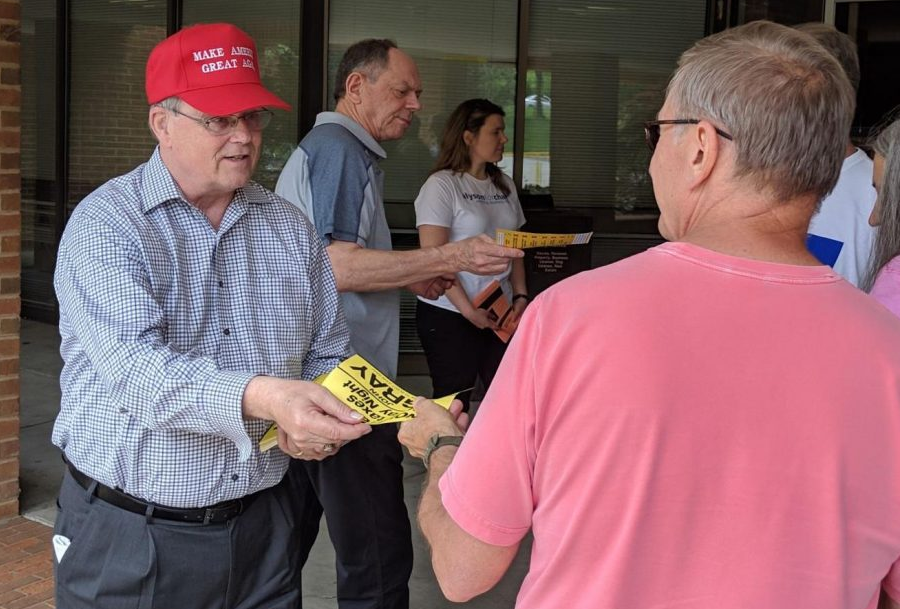
a firehouse primary nominating process in 2019 led to the selection of a pro-Trump Republican to run for chair of the Prince William Board of County Supervisors
Source: The Bull Elephant blog, Results in Prince William County Republican Firehouse Primary (May 4, 2019)
In the House of Delegates 97th District, Republicans nominated one candidate in a convention and another in a firehouse primary in 2019. Supporters of the two rivals recognized that the different processes would have different results.
Three conventions were scheduled originally, one each in the three counties covered in part by the 97th District. The incumbent realized after the convention in Hanover County that the challenger would win, so he arranged for a new person to be appointed to the 97th House Legislative District Committee. It then cancelled convention process and announced plans to hold a firehouse primary to choose the nominee.
Appeals to the 97th House Legislative District Committee failed to resolve the conflict. In the end, the Republican State Central Committee made the final decision in favor of the candidate chosen through the convention process. That allowed the challenger to become the nominee, and he won the seat even though some disgruntled supporters of the incumbent started a write-in campaign for the general election.17
The impact of choosing a convention vs. primary for nominating candidates was revealed again in late 2020. After Joe Biden defeated President Trump by 10 points in Virginia during the 2020 presidential race, the Republican State Central Committee chose to nominate its candidates for statewide races in 2021 in a convention.
Party leaders were trying to block a pro-Trump candidate, State Sen. Amanda Chase, from winning the nomination. In a reversal of normal assumptions, they thought that the politically-engaged delegates to a convention were less likely to be motivated by ideology and more interested in nominating a more-moderate candidate. No Republican had won a state-wide office since 2009, and District Committees were expected to choose delegates to a convention who prioritized victory rather than alignment with former president Trump. A convention would require repeated rounds of voting, if necessary, for the 2021 statewide candidates to win over 50% of the vote. In a crowded primary with multiple candidates, where a plurality of votes would determine the winner, the pro-Trump candidate was favored to win the nomination for governor.
The planned 2021 Republican convention was disrupted by the COVID-19 pandemic. The governor imposed limits on how many people could gather in one place, and assembling thousands of delegates at a political convention would exceed the authorized threshold. Efforts to modify the Party Plan to adapt to the circumstances were blocked by supporters of the pro-Trump candidate, who pressed for a switch to a primary. When the deadline for choosing a state-run primary passed, the advocates pressed for unassembled meetings across the state rather than a gathering in one location.
The Republican State Central Committee switched back and forth, adopting different proposals which then turned out to be impossible to implement with the COVID-19 restrictions. The battle over nomination procedures was a proxy war, reflecting the battle over whether a pro-Trump candidate should be the nominee. The final resolution was to hold an unassembled convention with delegates gathering in 37 places. A limited form of ranked choice voting was chosen, with delegates indicating just their top two choices.18
In its special session in 2021, the General Assembly required the process for nominating most candidates after 2024 to include absentee voting provisions. Parties who chose to use a state-run primary would benefit from the standard state procedures for absentee voting. Parties who chose an alternative would be required to find a way for the 90,000 Virginians serving in the US military, Virginia residents living overseas, and people with disabilities to vote by absentee ballot. The logistics and costs of bypassing the state-run primary process would be great.
The impact of the bill fell on just one political party. The Democratic Party, which controlled the General Assembly and the governor's office when the bill was passed, would be unaffected; it already was choosing to use the state-run primary process. However, the Republicans had chosen to use that technique to nominate candidates for Governor, Lieutenant Governor, and Attorney General only three times between 1953-2021, in 1989, 2005, and 2017.
The bill authorized use of conventions for special elections, and in cases where no candidate filed the required paperwork. Fairfax County Democrats took advantage of the exception for an October 2025 primary. They used a party-run primary to nominate a candidate for a special election to fill the seat of the Braddock District supervisor. The incumbent supervisor had earlier won another special election to serve in the US Congress.
Fairfax Democrats used Election Buddy software in 2025 to count the ballots in a ranked choice voting process. The winner received 60% of the vote in the first round, so the capacity to reallocate votes among the four candidates was not needed. The digital voting process involved no paper ballots, in contrast to state-run primaries that require paper ballots to validate the vote. The Election Buddy software crashed due to heavier-than-expected turnout, delaying the process and causing some voters to leave the polling place.
The 2021 bill steering parties to use state-run primaries was supported by Republicans who wanted to reduce the power of the various committees who chose delegates to conventions. Primaries, in contrast to conventions, were expected to broaden the number of Republicans engaged in the nomination process.
In 2024 an internal conflict within the Republican Party in Lynchburg led to a test of the state law. "Make America Great Again" (MAGA) conservatives who sought to oust a not-conservative-enough incumbent on the City Council arranged for a firehouse primary. That process was expected to nominate a different candidate, forcing the incumbent off the ballot.
How military personnel deployed overseas could participate in a firehouse primary that normally required in-person attendance was not clear. The member of the House of Delegates who had sponsored the legislation to ensure full participation said:19
The Attorney General, a Republican, issued an opinion that declared invalid any nomination process that required voters to be physically present in order to participate. The Republican Party of Virginia then notified all of its committees that the only acceptable nomination process was now the state-run primary.
In response, the Lynchburg Republican Party decided to nominate its candidate for City Council via the state-run primary on June 18, 2024. That "open primary" process allowed all registered voters, even independents and Democrats, to vote for the Republican Party nominee. In contrast to a firehouse primary, the local Republican committee could not limit participation to just those who had previously demonstrated partisan support for just Republicans.
The leader of the faction seeking a firehouse primary said:20
Also in 2021, the State Board of Elections tightened enforcement of the requirement to submit the proper paperwork, on time, to qualify for being listed on a primary ballot. It announced in advance that the board was ending its traditional leniency in granting extensions to candidates who filed late or incomplete reports.
When the deadline passed, paperwork had not been received by the board from eight candidates. The board proceeded to authorize candidates in five districts where a candidate had problems, but there were no opponents for that party's nomination. The board rejected requests for extensions by three Democrats who had planned to contest incumbents, but failed to get financial disclosure, certificate of candidate qualification, or other forms to the correct office by the deadline. In one case, a candidate for a House of Delegates seat had taken the paperwork to the Richmond registrar rather than the Virginia Department of Elections.
The rejection of extensions triggered claims that the State Board of Elections had changed its practice in order to protect Democratic incumbents from being challenged. One commentator was not sympathetic:21
Later in 2021, the State Board of Elections let three Republicans appear on the ballot even though their paperwork filings were incomplete. The board was flexible if local party officials had been responsible for the failure to file required paperwork, but rigid if candidates had been responsible for the failure, because:22
The State Board of Elections refused to accommodate an independent candidate who failed to submit a required financial disclosure form to the state office in Richmond. The candidate for a House of Delegates seat had provided the form to the registrar in his local jurisdiction, and relied upon her guidance that another copy of the paperwork did not need to be sent to state officials. That guidance was not correct for candidates seeking state office, and the State Board of Elections blocked the candidate from appearing on the 2021 ballot.23
The Republican Party sought to take advantage of the more-rigid enforcement when candidates failed to submit correct paperwork. It filed suit in 2021 to block Terry McAuliffe from appearing on the ballot as the Democratic candidate for Governor, because McAuliffe had failed to sign his declaration of candidacy form. The lawsuit also claimed that the state constitution barred McAuliffe from running for a second term, even though if elected he would not be serving consecutive terms.
The Richmond Circuit Court judge rejected both claims. He ruled that a signature from the candidate was not required; the requirements elsewhere in the Code of Virginia for signatures on notarized forms did not apply to a declaration of candidacy form. McAuliffe had appeared before two witnesses who were qualified voters, and that was sufficient to comply with the law:24
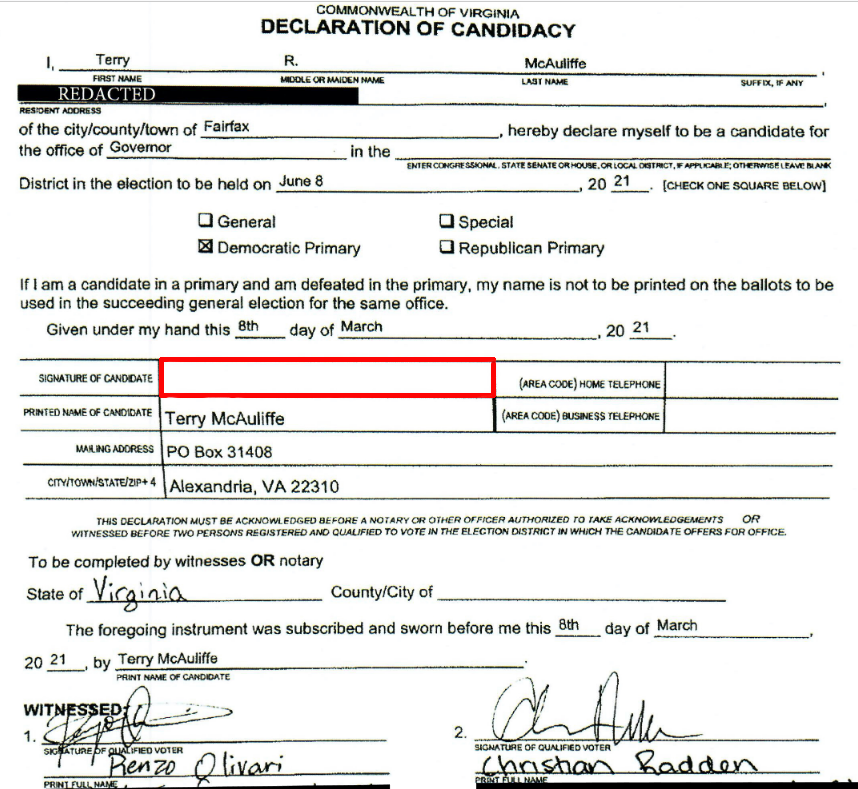
Terry McAuliffe failed to sign his candidate declaration form in 2021
Source: Republican Party of Virginia, Virginia GOP Files Lawsuit Seeking McAuliffe Disqualification
One Democrat in 2021 qualified to run simultaneously for two seats. Del. Elizabeth Guzman sought nomination by the Democratic Party for Lieutenant Governor and announced she did not plan to run for re-election to her 31st District seat in the June 8, 2021 primary. That resulted in three other Democrats filing paperwork to run for the House of Delegates in her district, as the immigrant from Peru hoped to become the first Hispanic elected to statewide office.
Del. Guzman then changed her mind and also qualified for the ballot for re-election to the House of Delegates. Running for two offices hedged her bet. If she won both nominations, she could run for both seats in the General Election in November. In her best case scenario, she would win both races and choose to take office as Lieutenant Governor, forcing a special election for the 31st District seat.
She decided in April, after seeing fundraising reports, that she could not win the Democratic nomination for Lieutenant Governor against six other candidates. Del. Guzman withdrew from the statewide race and focused on the House of Delegates contest. Her withdrawal came after ballots were sent to the printer, so her name still appeared in her district in two places. She won the Democratic Party nomination, and then won the general election in November for the 31st District House of Delegates seat.25
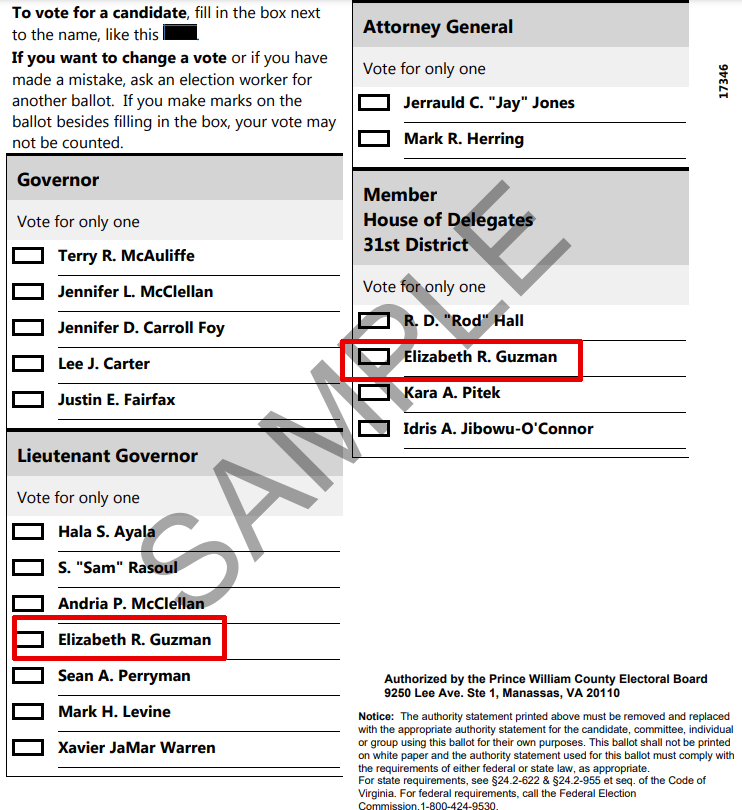
Del. Elizabeth Guzman appeared on the ballot for two seats in the June 8, 2021 Democratic Primary
Source: Prince William County Office of Elections, Sample Ballots
In a party-run primary, the parties set the rules. The Republican Party chose to use ranked choice voting in 2021, and Democrats in Arlington County followed that model in 2022.
To nominate candidates in a special election for the 4th District House of Representatives seat at the end of 2022, Republicans chose to use ranked choice voting in their firehouse primary. Democrats stayed with the traditional plurality winner approach. Initially three members of the General Assembly announced they were candidates along with two others, so the plurality process made it likely that the winner would not receive 50% of the vote in the firehouse primary. When one of the three incumbents withdrew, the significance of no using the ranked choice process was diminished.26
The Democratic nomination for a special election in 2022 was affected by a new requirement that candidates pay a $5,000 filing fee, a steep increase from the normal $360 fee. In the race for the 7th District seat in the State Senate, only one of the two Democratic candidates paid the fee. The planned caucus of the Virginia Beach Democratic Committee was cancelled, with a declaration that only one candidate had qualified. The other filed a lawsuit claiming the fee was unconstitutional, hoping the state courts would interfere in the party-run nomination process.27
The power of the Virginia Department of Elections to determine the form of a political party's nomination process was challenged in 2023. The Republican Legislative District Committee for the 17th State Senate District initially decided on December 27, 2022 to hold a party-run convention to nominate a candidate. The committee then changed its mind. It filed paperwork with the State Board of Elections by the March 1 deadline to certify a decision to select a candidate through the state-run nomination primary on June 20.
The Department of Elections included the 17th State Senate District in the initial list of scheduled June 20 primary elections. When the state agency dropped the district from a later list, the chair of the 17h District Committee filed a lawsuit against the Elections Commissioner and the State Board of Elections. She contended that the State Board of Elections had no discretionary authority to modify decisions made by the political party's district committee.
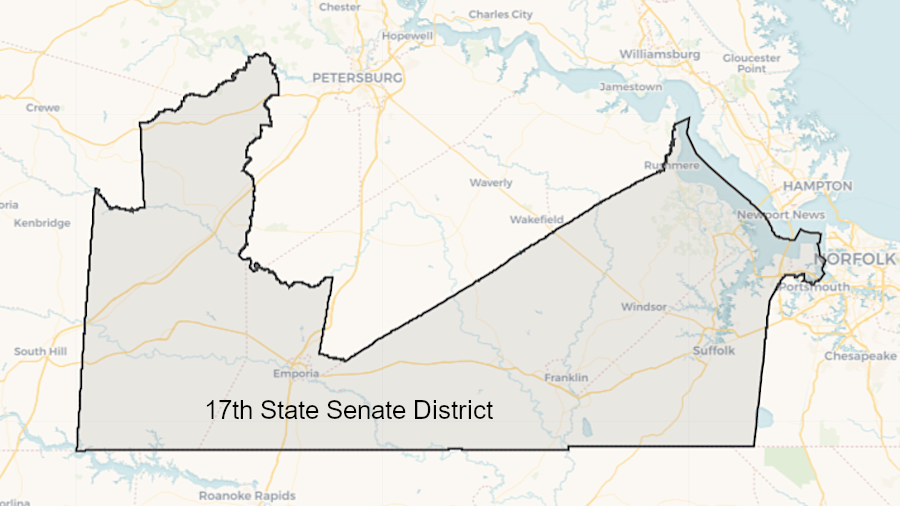
state Republican officials failed in their 2023 effort to overturn the decision of the 17th State Senate District Committee to hold a primary rather than a convention
Source: Virginia Public Access Project (VPAP), State Senate District 17
The chair claimed that Governor Youngkin and top leaders in the Republican Party of Virginia were trying to change the nomination process to benefit one candidate in the contested primary.
The dispute was tied to a proposal by the Suffolk Republican Committee to censure the Republican Speaker of the House of Delegates, Todd Gilbert. For tactical political reasons in 2023, when all 140 seats in the General Assembly were on the ballot, Gilbert had blocked votes on bills to restrict abortion and other conservative issues. The 17th State Senate District Committee anticipated a primary rather than a convention would help the more-conservative candidate, a former race-car driver, rather than the member of the House of Delegates that Governor Youngkin supported.
The conflict over the nomination process was not partisan; the Elections Commissioner and all the parties to the lawsuit were Republican officials. The chair of the Republican Party of Virginia claimed the district chair had "gone rogue." The direction to the Elections Commissioner to change the nomination process reportedly was delivered by the chief of staff working for Republican Governor Glenn Youngkin.
The Republican Party of Virginia claimed that the district committee's decision to hold a June 20 primary was not official. Before the vote to switch to a primary, the Second District Republican Committee (with oversight responsibility for the 17th State Senate District Committee) had declared that the 17th State Senate District was dysfunctional and removed most of the officers. The district committee chair appealed the decision, and claimed that the committee remained operational during the appeal period.
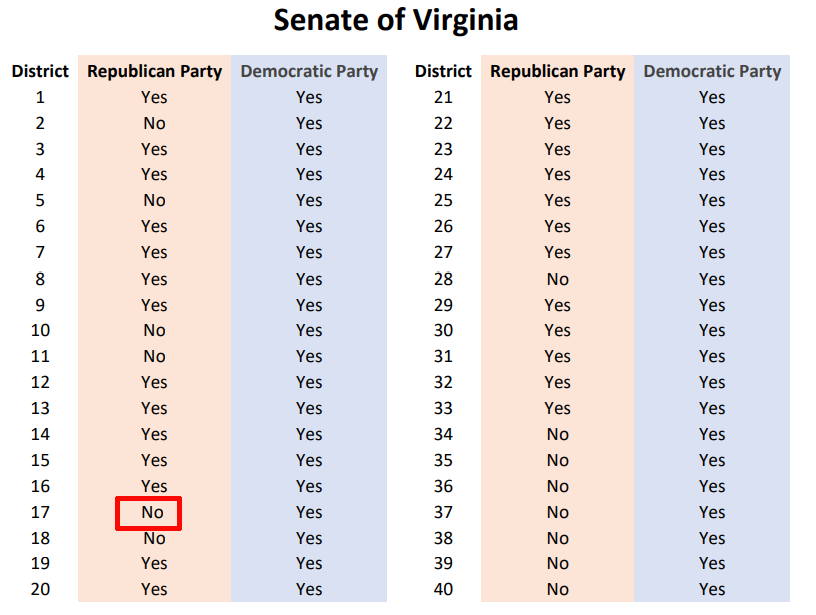
until overruled by a court, the State Board of Elections publicized that the Republican Party would not use the state-run primary on June 20, 2023 in the 17th State Senate district
Source: Virginia State Board of Elections, Virginia General Assembly 2023 Primary Elections (March 10, 2023)
The state party asserted that there had not been not a quorum at the second meeting of the district committee, when the decision was made to switch to a primary. Without a quorum, the state party asserted that the earlier December decision to use a party-run convention was the legitimate choice.
However, the chair of the Suffolk Republican Committee had filed paperwork with the Virginia Department of Elections certifying the decision by the district committee to hold a primary. No one filed paperwork based on the earlier December decision to hold a convention. The lawsuit claimed the Virginia Department of Elections was required to comply with the one official filing and schedule a primary election in the 17th District.
Candidates had to file by April 6, 2023 to get their names printed on primary ballots, so the lawsuit asked for a quick judicial decision. Before the end of March, the judge decided that the nomination contest should be decided by a primary rather than a party-run convention.
The judge ruled that the Department of Elections was not authorized to decide if the Republican Party of Virginia had made decisions according to its Plan of Organization ("Party Plan"); resolving intraparty disputes of the political organization were outside the state's scope of authority. The paperwork calling for a primary had been filed correctly, and state's role in announcing the chosen form of nomination was just ministerial.
In the actual primary, Governor Youngkin's preferred "more electable" candidate won, not the former NASCAR driver preferred by the more-conservative Suffolk Republican Committee. The dispute over the nomination process was not damaging to the final Republican candidate, Del. Emily Brewer. She went on to win the 17th District seat in the State Senate in the November 7, 2023 General Election.30
As a result of the court ruling, the Republican nomination process for the 84th House of Delegates District changed for a fourth time even though no one had filed a lawsuit for that district. The Virginia Department of Elections had switched the nomination process between March 9 and March 10 and deleted the 84th House District from the list of those holding a primary on June 20, along with the 17th State Senate District.
The final list of districts in which the Republican Party chose the state-run primary process included 59 House and 27 Senate districts, including both the 17th State Senate District and the 84th House District. The Democratic Party chose the state-run primary process in all 140 districts.
In many districts where state-run primaries were chosen, only one candidate ended up filing for a political party's nomination. Without two people filing, there was no need for a primary contest to select a candidate for a party. On June 20, 2023, there were state-run primary elections for candidates in 24 House districts and 20 State Senate districts.
In the 2nd House of Delegates district, there was a Democratic primary even though there was only one candidate in 2023. A second candidate had filed, but withdrew from the race after ballots had been printed. A similar situation in the 50th House District required Mecklenburg County to spend $18,000 to open the polls and go through the process, because there was no mechanism to cancel a scheduled primary. The Virginia Department of Elections determined that primaries were still required, but voters would be notified about the withdrawal.
Of the 40 incumbent state senators, 12 (30% of the State Senate) faced primary challenges. The high number reflected the unusual 2021 redistricting done by the Supreme Court of Virginia, not by the General Assembly. In the end, new district maps were adopted that did not take into consideration where incumbents lived.
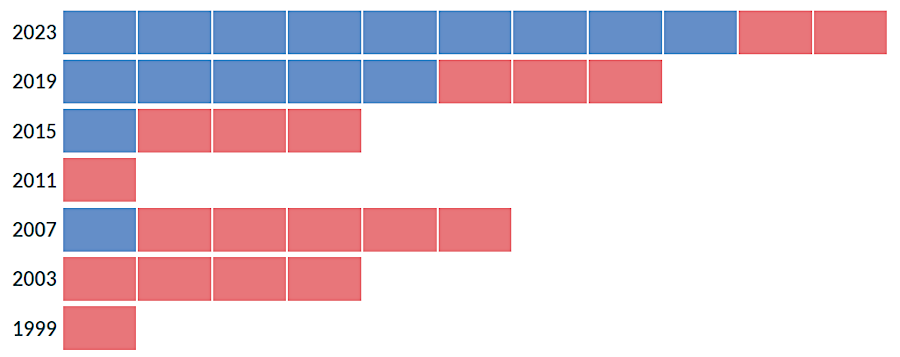
primary challenges for State Senate seats peaked in 2023, after the 2021 redistricting failed to protect incumbents
Source: Virginia Public Access Project (VPAP), Primary Challenges Up in the Senate, Down in the House
Republicans used the state-run primary to select candidates in 9 House districts and Democrats in 16. Both parties held a primary for the 84th District. For State Senate races in 2023, Republicans used the primary to choose 7 candidates while Democrats used the process to pick 15 candidates. Both parties held primaries in the 27th and 29th districts. Turnout for the June 29, 2023 primary ranged from 43% of eligible voters in a Buchanan County precinct to less than 1% in a Prince Edward County precinct.
Fights over the nomination process were relevant because primaries and conventions provide advantages to different types of candidates. The Republican Committee chairs for Pulaski and Montgomery counties chose to use the "mass meeting" process rather than a firehouse primary or the state-run primary in June 2023, in order to nominate the candidate for the 42nd District of the House of Delegates. The decision was so controversial that both chairs resigned their positions before the mass meeting was held.
Over 1,200 Republicans packed the room at New River Community College, some waiting as much as five hours as everyone was registered before hearing five-minute presentations from the two candidates. The committee chairs from Pulaski and Montgomery counties had shaped the nomination process to increase the chances of one candidate, but in the end he received less that 10% of the votes from a disgruntled and restless crowd. Had the Republican Party used the firehouse primary or state-run primary process, people could have cast their votes in just a few minutes and then left.
A very experienced observer commented in 2023:31
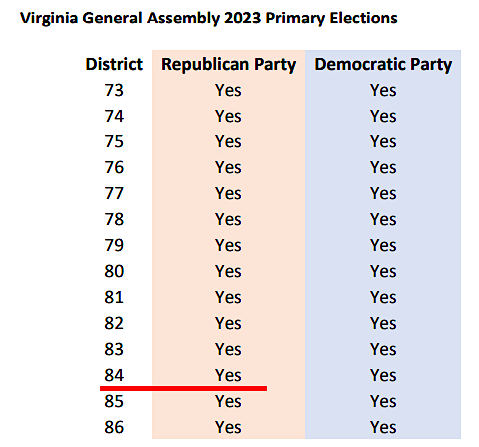
in the end, the 84th House of Delegates District Republican Party nomination process was by primary
Source: Virginia Department of Elections, Virginia General Assembly 2023 Primary Elections
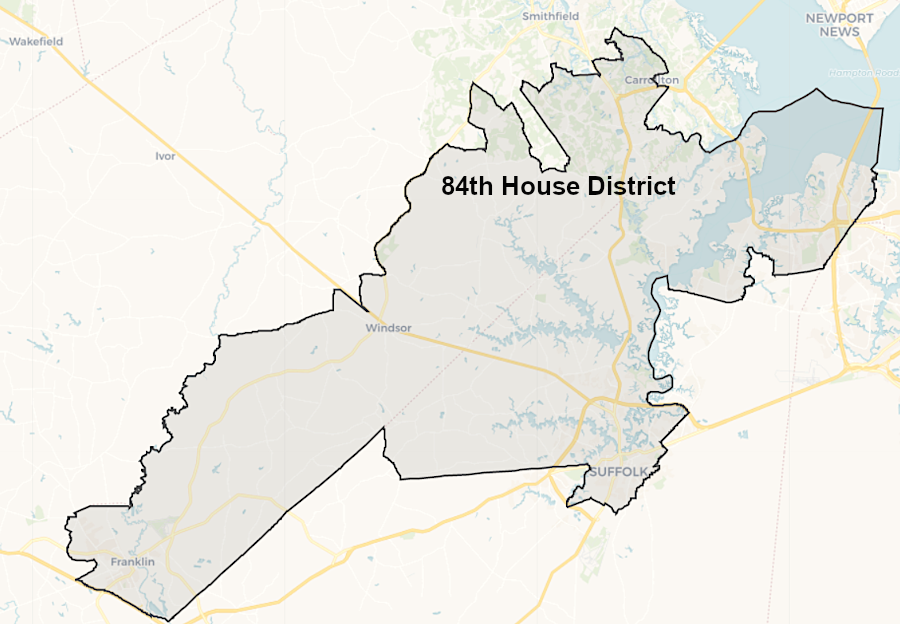
the Republican nomination process for the 84th House of Delegates seat in 2023 swiched four times before ending up as a primary
Source: Virginia Public Access Project (VPAP), House of Delegates District 84
For state-run primaries, the leadership in a political party does not have any authority to certify that a candidate really belongs to a particular party or to block a "spoiler" candidate from getting on the party's primary ballot. Any candidate who gathers enough signatures and submits the required paperwork to the Virginia Department of Elections will appear on the ballot in that party's primary, even if the candidate had no previous affiliation with that party.
In 2023, both the Democratic and Republican parties scheduled primaries to nominate candidates for the position of Chair of the Board of County Supervisors in Prince William County. Until near the deadline, only one Republican had announced as a candidate for chair. She was an opponent of expanding the area where data centers could be built, a particularly hot local land use issue at the time.
There was a contested primary within the Democratic Party. The incumbent was an advocate for expanding the area in which new data centers could be built. Her challenger had strong support from Republicans. There was the possibility that enough Republicans would skip the Republican primary on June 20 and vote in the Democratic primary to tilt the decision towards the challenger. In Prince William County at-large elections for Chair, Democratic candidates were favored to win.
Then a second Republican, Kenn Knarr, filed to run in that party's primary. The new candidate was an advocate of expanding the data center zone, and he had a track record of supporting the Democratic incumbent and contributing to other Democrats. In response, nearly all the leaders of local Republican Party committees objected to a "Democrat masquerading as a Republican" - but they could do nothing to force him off the primary ballot.
Republican voters opposed to the expansion of the data center zone were now faced with a choice of casting a ballot in the Republican primary or the Democratic primary for candidates reflecting their preference on the data center issue, but could vote in only one of the two primaries on June 20. Voting in the Republican primary might ensure their preferred candidate won that party's nomination. Voting in the Republican primary would block voters energized over the data center issue from crossing over to support the challenger in the Democratic primary. As a result, the pro-data center Democratic incumbent had a greater chance to win the June primary and then the general election in November.
That dilemma could have been avoided. If the Republican Party had chosen to use a party-run nomination process for the selection of a candidate for Chair of the Board of County Supervisors, Republican voters could have participated in both the party-run Republican primary and the state-run Democratic primary on June 20. Republican Party leaders in Prince William County complained that Kenn Knarr was a Democrat meddling in the nomination of the Republican candidate, but the practical effect of him running was to limit the ability of Republicans to meddle in the Democratic Party's primary.
In the June 20, 2023 primary, Ken Knarr lost the Republican nomination; Jeanine Lawson won by over 8,000 votes. In the end, none of those Republican votes were needed by the Democratic candidate who shared Lawson's position on data centers. Democratic challenger Deshundra Washington defeated the incumbent, Ann Wheeler, with 52% of the vote. The effort to nominate a "fake Republican" to facilitate nomination of a pro-data center Democrat failed.28

Republican officials in Prince William County objected to a Democrat running for the Republican nomination for Chair of the Board of County Supervisors
Source: InsideNOVA, Statement on Knarr, Lawson
Another option was proposed by the Virginia Department of Elections in 2020, after local party officials had failed to submit paperwork on time. The state agency suggested that state chairs of each political party should be the responsible officials for submitting the official list of party candidates to be printed on ballots; local party officials would no longer have that responsibility.
The 2020 General Assembly rejected the proposal to centralize the process, in part because the bill was amended to include a mandate that only primaries could be used to nominate candidates. A requirement expected to force all parties to drop conventions and use a primary was ultimately included in another bill which restricted nomination methods that excluded military personnel serving overseas. However, local city/county party officials remain responsible for submitting official nominations, and identifying how candidates will be nominated, to the State Board of Elections.
One State Senator commented that the local party officials did not have confidence in the state party officials:29
Another 2023 nomination process revealed how "slating" delegates could impact the results of a convention. Three candidates sought the Republican nomination for the 56th House District seat in the House of Delegates. The decision was made by 223 delegates at a party-run convention.
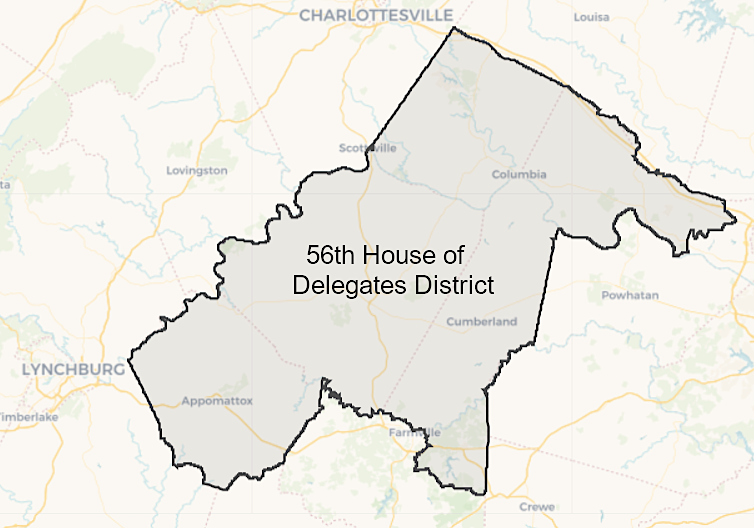
the Republican contest for the 56th House of Delegates seat in 2023 included objections to Appomattox County "slating" its delegates to the nominating convention
Source: Virginia Public Access Project (VPAP), House of Delegates District 56
Each Republican County Committee within the district was entitled to send a certain number of those 223 delegates, based on the population of that county within the boundaries of the 56th House District and also the number of Republican votes cast within that county in the last two Federal elections. The formula rewarded counties that voted strongly Republican, giving them a greater voice in the nomination process.
Traditionally, county committees chose delegates and then those delegates voted as they desired in the convention. In 2023, the Appomattox County committee considered "slating" its delegates and directing all of them to vote for just one candidate. The slating process was authorized under the "Party Plan" of the Republican Party of Virginia.
One of the three candidates, who would lose the opportunity to get votes from some Appomattox County delegates, complained that slating was unethical:32
The requirement after 2024 to include absentee voting provisions even in primaries did not completely eliminate the party-run process. The candidate nominated by the Republican Party for the Ward 3 seat on Lynchburg City Council withdrew from the race on September 2, 2024. That was less than a week before the State Board of Elections September 6 deadline for printing ballots. Due to the tight deadline, state law allowed for the Lynchburg Republican City Committee to select the replacement candidate.
The selection process, with what appeared to be a pre-determined decision on a replacement candidate, frustrated the Hill City Young Republicans. That group was active in Ward 3, which included Liberty University. They noted in a Facebook post:33
In other states, Kennedy could not withdraw his nomination. In Michigan, where he was the nominee of the Natural Law Party, state law required retaining his name on the ballot. Independent candidates could withdraw, but Michigan did not allow candidates nominated by a party to drop off the ballot because that would harm the interest of the party.
The Democratic Party had nominated Kamala Harris as their candidate in August, after incumbent President Joe Biden withdrew from the race prior to the party's nominating convention in Chicago. Voters were able to vote for Trump, Harris, or one of four other candidates in the November 5, 2024 election. Jill E. Stein was nominated by the Green Party and Chase R. Oliver was nominated by the Libertarian Party. Claudia De la Cruz was listed as an Independent on the ballot, but she campaigned as the leader of the Party for Socialism and Liberation.34

Claudia De la Cruz and Karina Garcia, 2024 candidates of the Party for Socialism and Liberation for President and Vice-President, appeared on the Virginia ballot as Independents
Source: Party for Socialism and Liberation
Dr. Cornel West collected almost 10,000 signatures, enough to appear on the ballot. His campaign highlighted that he chose to run as an independent, rather than to compete for the Republican or Democratic nomination, because he considered political parties to be too indebted to special interest groups:35
The Virginia Department of Elections initially disqualified West, citing problems with the Elector Oath forms filed by the 13 people who would cast votes for him in the Electoral College. The General Assembly changed requirements so after July 1, 2024, electors had to be a US citizen and a legal resident of Virginia. The West campaign appealed. It noted that the forms which the state claimed were outdated had been completed prior to the July 1 change.
The Virginia Department of Elections reversed its decision on September 6, 2024 and planned to print West's name on the ballot:36
A law firm then threatened to file suit, claiming two of the notarized submissions of Elector Oaths were invalid due to inconsistencies in dates. The law firm notified the state agency on September 9 of its demand to remove Dr. Cornel West and his vice-presidential candidate Melina Abdullah from the ballot. The state agency faced tight deadlines for making decisions because ballots had to be available for early voting on September 20, and did not remove Conel West's name.37
The requirement for the Elector Oath to identify as a US citizen was consistent with Virginia law that voters had to swear that they were a US citizen. Documentation of that status is not required in order to register to vote in Virginia, but lying on a voter registration form is a Class 6 felony.38
Nomination by a political party does not guarantee that the top leaders in that party always will provide support. In 1977 Republican Governor Mills Godwin endorsed the Democratic candidate for Attorney General, Ed Lane. The two had been close political allies when Godwin was a Democrat, including his first term as governor. The Republican nominee, Marshall Coleman, campaigned against the Massive Resistance policies that Lane and Godwin had supported in the 1950's and 1960's. In the end, Coleman defeated Lane and won the Attorney General race without Governor Godwin's support.
It is extremely rare for a candidate who has won nomination to a statewide office to withdraw from the race. In 1957, Howard Gilmer won the Democratic nomination for Attorney General. At that time, Virginia was a one-party state and Democratic candidates always won statewide races. Gilmer withdrew after he was censured by professional life insurance associations for influence peddling. The Democratic State Central Committee chose a new candidate. Albertis Harrison ended up being elected Attorney General in 1957 and Governor in 1961.
In 2025, John Reid became the Republican candidate for Lieutenant Governor. His one opponent, expected to win the primary with far more name recognition and funding, withdrew for health reasons after it was too late for anyone else to qualify for the ballot. Reid was the first openly gay candidate to be nominated by the Republican Party. He was expected to be part of a "rainbow" Republican ticket reflecting diversity, with a black woman running for governor and a Hispanic man running for Attorney General.
Then an online social media account created in 2014 was discovered with pictures of nude men, using the same handle as John Reid. The nominee foir Lieutenant Governor claimed it was not his account, but Governor Glenn Youngkin called for Reid to withdraw and allow the Republican State Central Committee to select a replacement. Reid refused the request, and the governor's chief political strategist had to resign to deflect the blame.39
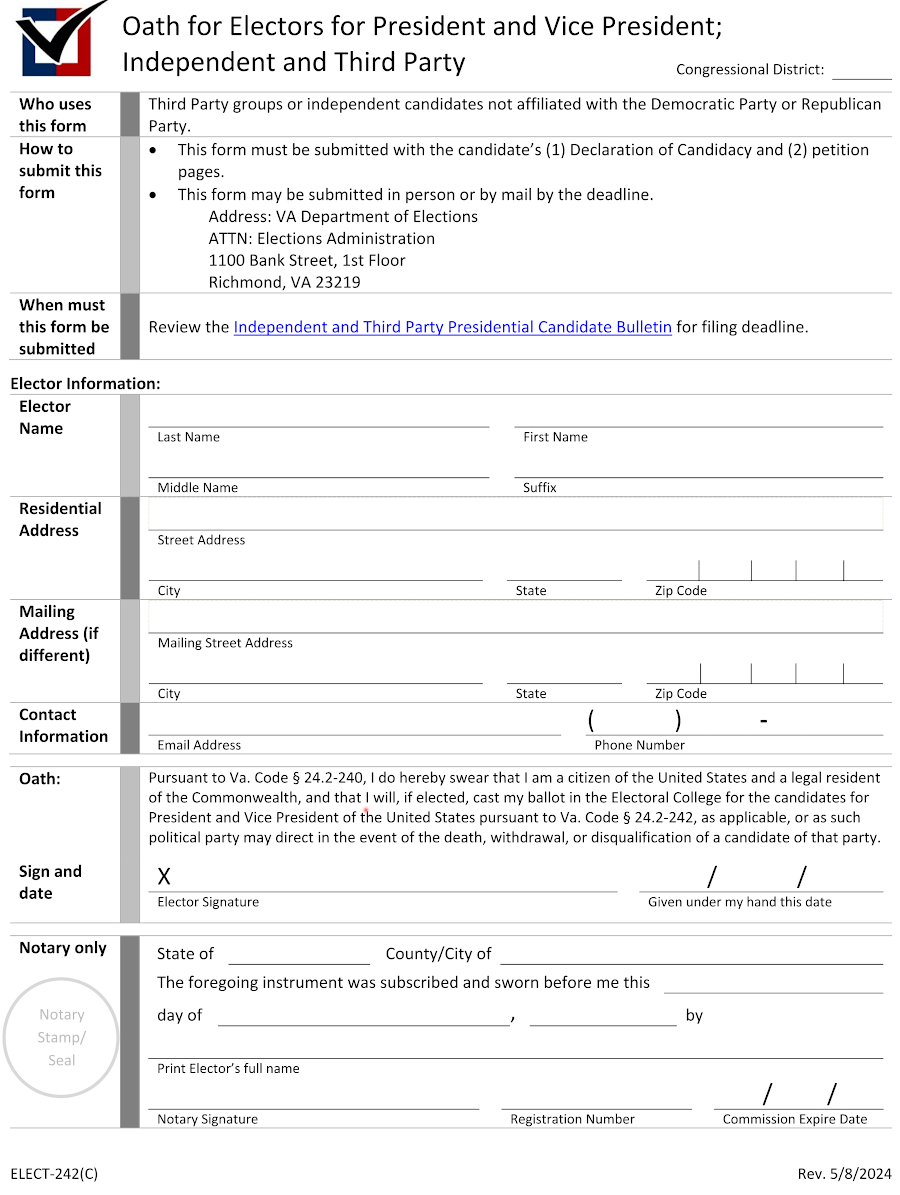
Virginia voters choose 13 members of the Electoral College; they are the only Virginians who vote directly for president and vice-president
Source: Virginia Department of Elections, Oath for Electors for President and Vice President; Independent and Third Party
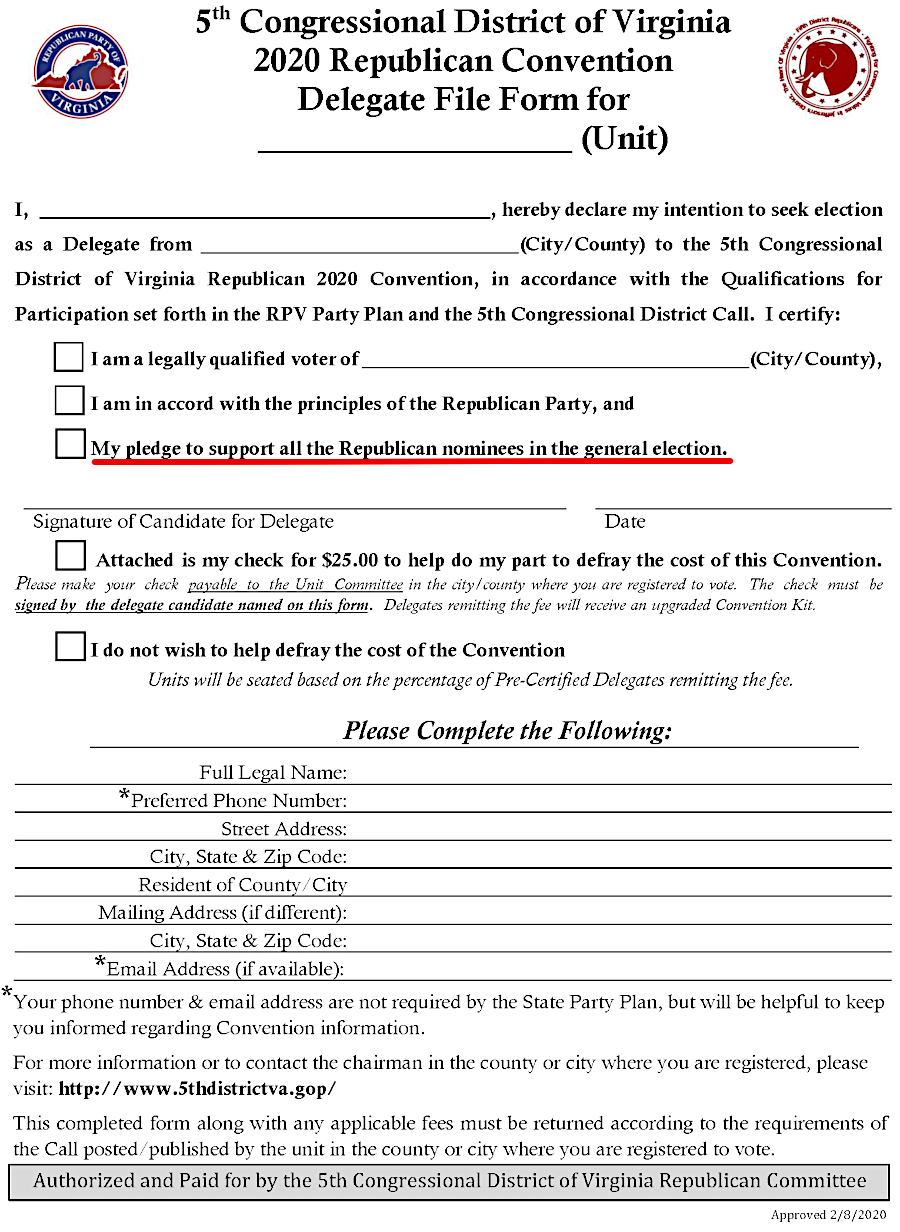
potential delegates to District and State conventions have to commit in advance to support whichever candidates are nominated by their party, unlike voters in state-run primaries
Source: Democratic Party 2020 Call To Caucus To Elect State Delegates, 5th Congressional District Republican Committee, Pre-file Form Unit Template